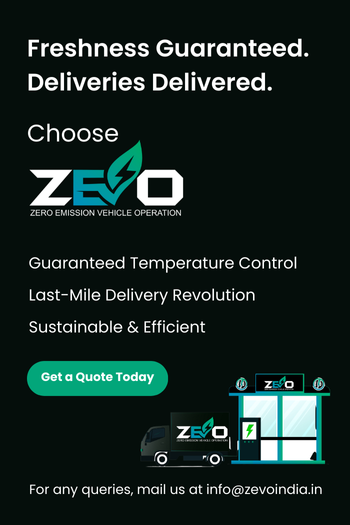10 Tips for Maximizing Efficiency in Food Delivery with Electric Vehicles

Akshay Sharma
CEO's Office @ZEVO
To maximize electric vehicle food delivery efficiency, consider the following actionable tips:
1. Route Optimization
Utilize advanced EV routing algorithms that incorporate real-time traffic data to determine the most efficient paths. Techniques such as dynamic Dijkstra’s algorithm can help in identifying energy-saving routes while accounting for current traffic conditions. This is key to EV food delivery optimization.
2. Charging Station Integration
Plan delivery routes to include charging station integration strategically. By incorporating charging stops into the route, drivers can minimize downtime and ensure that vehicles remain charged throughout the delivery process. Predictive models can assess charging needs based on route length and vehicle battery capacity, contributing to more efficient food delivery with EVs.
3. Time-Based Charging Strategies
Implement time-based charging strategies that take advantage of lower electricity rates during off-peak hours. This reduces operational costs and manages load balancing on the electrical grid, contributing to how to improve electric vehicle food delivery efficiency.
4. Multi-Vehicle Coordination
For fleets, coordinate multiple vehicles to share charging resources efficiently. Scheduling charging times based on vehicle routes and needs reduces congestion at charging stations, optimizing multi-vehicle coordination and maximizing overall EV food delivery optimization.
5. Real-Time Monitoring
Use telematics and real-time monitoring systems to track vehicle performance, battery levels, and route efficiency. This data informs dynamic adjustments in delivery routes and charging schedules, allowing for predictive analytics for food delivery.
Encourage load balancing at charging stations to prevent bottlenecks. Algorithms can distribute vehicles across multiple charging points based on current demand and availability, contributing to how to reduce charging time for food delivery EVs.
7. Driver Training
Invest in driver training for EVs on practices like regenerative braking and maintaining optimal speeds, which enhance energy efficiency. Proper training plays a crucial role in best practices for using EVs in food delivery.
8. Utilize Predictive Analytics
Employ predictive analytics to forecast demand trends and adjust delivery schedules accordingly. This optimizes both routes and charging needs based on expected order volumes, helping businesses maximize electric vehicle food delivery efficiency.
9. Incentivize Off-Peak Deliveries
Consider offering incentives to incentivize off-peak deliveries when traffic is lighter and energy costs are lower. This strategy not only improves delivery efficiency but also makes food delivery electric vehicle best practices more sustainable.
10. Continuous Improvement Feedback Loop
Establish a feedback loop for continuous improvement in EV food delivery by analyzing performance metrics regularly. This helps refine routing algorithms, charging strategies, and operational practices, ensuring strategies for efficient EV fleet management in food delivery evolve over time.
Enhance Your Operations with ZEVO India’s EV as a Service
In addition to these strategies, consider partnering with ZEVO India for your EV as a Service need. ZEVO India offers a comprehensive solution for food delivery businesses looking to adopt electric vehicles without the burden of ownership. With ZEVO India, you can lease or subscribe to electric vehicles, access top-tier fleet management services, and benefit from integrated charging infrastructure.
ZEVO India’s EV as a Service includes:
- Flexible Leasing Options: Scale your fleet based on demand without large upfront investments.
- Comprehensive Fleet Management: Rely on ZEVO India’s expertise for vehicle maintenance and performance monitoring.
- Optimized Charging Solutions: Benefit from their strategic approach to charging station integration and load balancing at charging stations.
- Advanced Telematics: Use real-time data to enhance route optimization and predictive analytics.
By leveraging ZEVO India’s EV as a Service, you can streamline your operations, reduce costs, and support sustainability initiatives with minimal hassle. This partnership will ensure your food delivery service benefits from the latest in electric vehicle technology and efficient fleet management practices.

Share this Article
Subscribe to our newsletter
Be the first to receive exclusive offers and the latest news on our products and services directly in your inbox.
